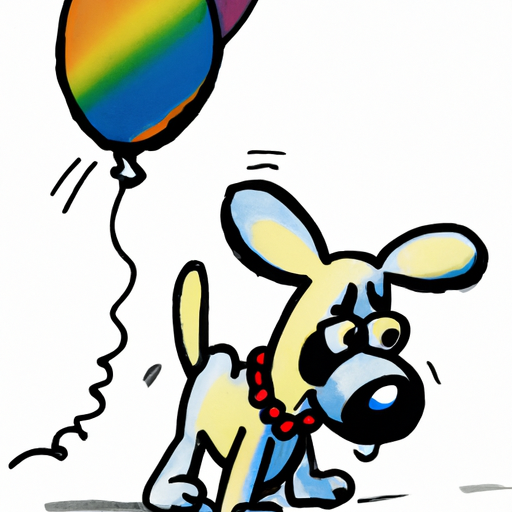“`markdown
Why Are Dogs Scared of Balloons?
Understanding Your Dog’s Fear
You might have noticed your furry friend cowering, whimpering, or darting to another room at the sight of balloons. This behavior is not uncommon. Dogs have different perceptions and reactions to their environment than humans, and what seems harmless to us can be terrifying to them.
- Sudden Movements: Just like a leaf blowing in the wind can startle your dog, so can a balloon bobbing in the air.
- Loud Noises: Balloons pop, and when they do, they make a sound that can be terrifying to your dog.
- Unfamiliar Objects: If your dog has never seen a balloon before, they might be scared simply because it’s an unknown object.
The Science Behind The Fear
Dogs rely heavily on their senses. Their hearing and smell are far superior to ours, and this can make certain stimuli more intense for them.
- Sound Sensitivity: Dogs can hear frequencies ranging from 40 Hz to 60,000 Hz, while humans can only hear between 20 Hz and 20,000 Hz. This means a balloon popping is much louder to a dog.
- Fear of the Unknown: Dogs are naturally curious but can also be wary of things they don’t understand. A floating, bobbing object like a balloon can be unsettling.
How To Help Your Dog Overcome This Fear
Helping your dog overcome their fear of balloons requires patience, understanding, and a gentle approach.
- Gradual Exposure: Start by placing an uninflated balloon somewhere your dog can see it. Let them sniff it and get used to its presence.
- Positive Reinforcement: Each time your dog interacts with the balloon without fear, reward them with a treat or praise.
- Slow Inflation: Over time, start to inflate the balloon slowly, letting your dog adjust to its new shape and movement.
Why You Shouldn’t Ignore This Fear
Ignoring your dog’s fear of balloons doesn’t make it go away. In fact, it could make the fear worse and even lead to more generalized anxiety.
- Increased Stress: Ongoing fear can cause chronic stress in dogs, which can lead to health problems.
- Behavioral Issues: Fear can lead to behavioral problems, such as aggression or destructive behavior.
- Poor Quality of Life: Living in constant fear can significantly reduce your dog’s quality of life.
FAQ
Q: Why is my dog scared of other objects too?
A: Dogs can develop fears to various objects due to bad experiences, lack of socialization, or inherent breed characteristics.
Q: Can I force my dog to face its fears?
A: Forcing your dog to face their fears can actually make the fear worse. It’s better to use gradual exposure and positive reinforcement.
Q: Can I use anti-anxiety medication for my dog’s fear of balloons?
A: Medications can be used in severe cases, but it’s always best to consult with your vet first.
Q: Are certain breeds more prone to fears and phobias?
A: Yes, certain breeds can be more prone to fears and phobias due to their genetic predispositions and breeding histories.
Q: Will my dog ever completely overcome its fear of balloons?
A: With patience, time, and the right approach, it’s possible for many dogs to overcome their fears. However, every dog is unique, so there’s no guarantee.
“`



